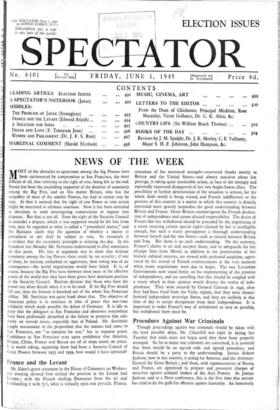NEWS OF THE WEEK
MOST of the obstacles to agreement among the big Powers have been surmounted by compromises at San Francisco, the most difficult of all, that referring to the right of veto, being left to the end. Russia has been the unyielding supporter of the doctrine of unanimity among the Big Five, and on this matter Britain, who has the sympathy of most of the smaller Powers, has had to retreat step by step. At first it seemed that the right of one Power to veto action might be restricted to ultimate sanctions. Now it has been extended to decisions to send investigating commissions to inquire into disputes. But that is not all. Even the right of the Security Council to consider a dispute, which it was supposed would be left free from veto, may be regarded as what is called a " procedural matter," and the Russians claim that the question of whether a matter is procedural or not shall be subject to veto. In essentials it is evident that the unanimity principle is winning the day. In his broadcast last Monday Mr. Stettinius endeavoured to allay uneasiness on this point. His line of argument was to show that without unanimity among the big Powers there could be no security ; if one of them, he insisted, embarked on aggression, then voting was of no consequence—the world organisation would have failed. It is, of course, because the Big Five have between them most of the effective power of the world that they have been given their dominant position n the Security Council. Realism dictates that those who have the power can alone decide when it is to be used. If the Big Five should fall out, then the bottom is knocked out of the whole San Francisco edifice. Mr. Stettinius was quite frank about that. The objective of American policy is to continue in time of peace that war-time solidarity which made possible the defeat of Germany. It is idle to deny that the delegates at San Francisco and observers everywhere have been profoundly disturbed at the failure to preserve that soli- darity on several issues, especially that of Poland. Mr. Stettinius sought reassurance in the proposition that the nations had come to San Francisco, not " to conspire for war," but to organise peace. Confidence in San Francisco rests upon confidence that America, Britain, China, France and Russia are all of them intent on peace.
is worth asking, supposing there had been a Security Council of Great Powers between 1933 and 1939, how would it have operated?


























